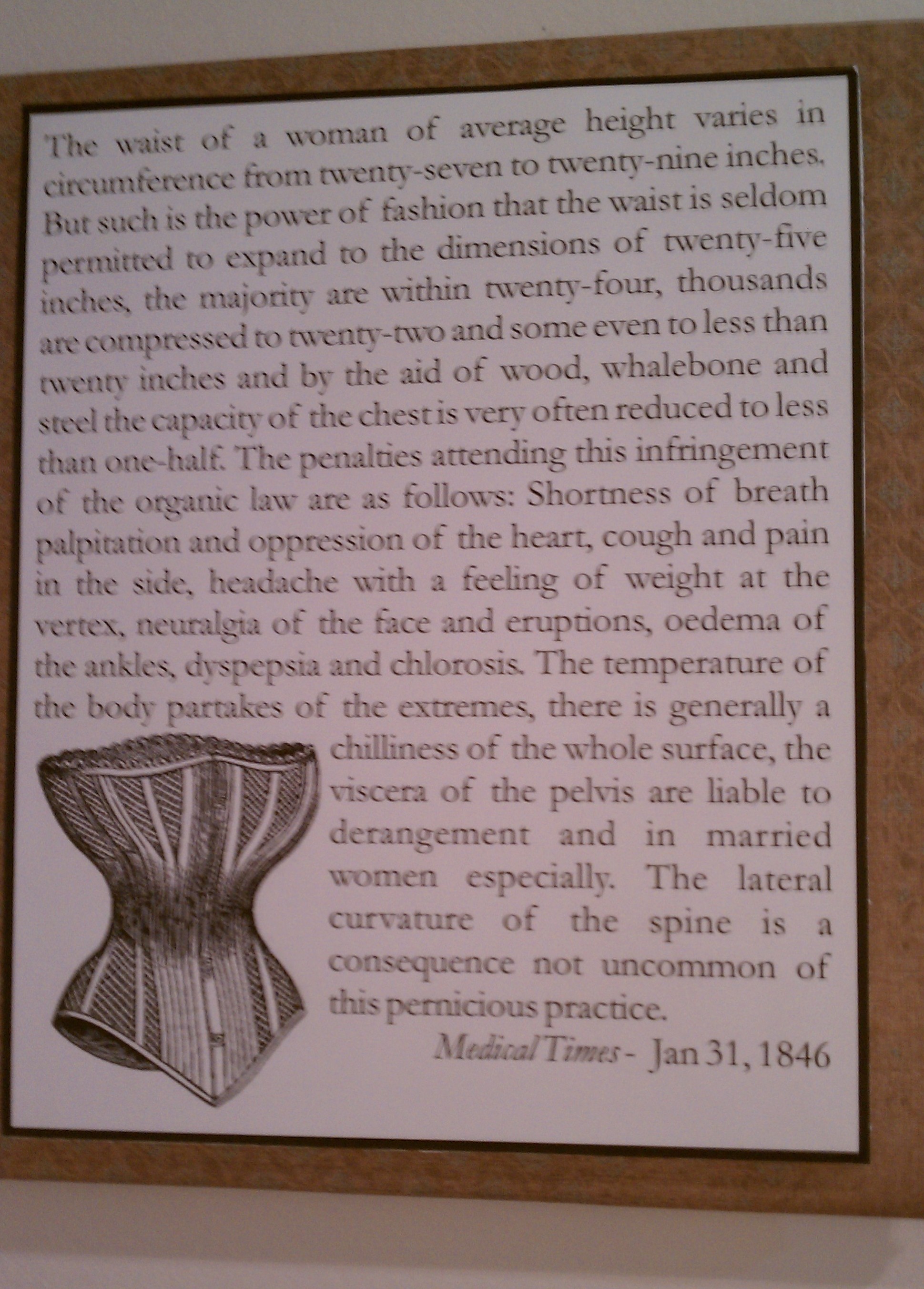My husband has always been a student of military and naval history. He spouts off bits of arcane knowledge – types of cannon, length of ships, dates of battles – which really don’t matter to anything or anyone (at least, they don’t matter to me).
On our recent visit to the Museum of the Oregon Territory, however, I was able to explain to my husband why Oregon City was located where it was, why John McLaughlin built the first mill at Willamette Falls, and why San Francisco’s first plat was filed in Oregon City rather than in California. This information was all available at the museum, but I was sometimes a step ahead of their display, or I provided more detail than was shown on the placards. I felt pretty smug about my grasp of Oregon Trail trivia.
 But one bit of trivia I saw at the Museum of the Oregon Territory surprised me – a detailed description of the impact of corsets on women’s health.
But one bit of trivia I saw at the Museum of the Oregon Territory surprised me – a detailed description of the impact of corsets on women’s health.
The display in the museum quoted The Medical Times of January 31, 1846. I found this same quote on Google Books, in Health and Beauty; or Woman and Her Clothing, by Madame Roxey Ann Caplin.
“The waist of well-formed women, of the average height, varies in circumference from twenty-seven to twenty-nine inches; and there is scarcely any difference in its proportional size between male and female. But such is the power of fashion, that the waist is seldom permitted to expand to the dimensions of twenty-five inches; the majority are within twenty-four; thousands are compressed to twenty-two; and some even to less than twenty inches; and by the aid of wood, whalebone, and steel, the capacity of the chest is very often reduced to less than one-half. The penalties attending this infringement of the organic law are as follows:—Shortness of breath; palpitation of the heart; cough, and pain in the side; headache, with a feeling of weight at the vertex; neuralgia of the face, and eruptions; edema of the ankles; dyspepsia and chlorosis. The temperature of the body partakes of the extremes; there is generally a chilliness of the whole surface; the viscera of the pelvis are liable to derangement, and in married women especially. The lateral curvature of the spine is a consequence, not uncommon, of this pernicious practice.” Medical Times
Another blogger has also written about the problems caused by corsets. And in Eight Cousins, Louisa May Alcott made the point as well.
It sounds as if almost any medical problem women encountered in the middle of the nineteenth century could be attributed to their corsets. Heaven knows I wouldn’t want to have the viscera of my pelvis liable to derangement! Nevertheless, despite the health issues of overly constrictive corsets, the fashion continued into the twentieth century.
My husband is a reader of history and I am a writer of historical fiction. He likes history for its own sake. I use history to add color and texture to the stories I write – one of the joys and perquisites of writing historical fiction is encountering interesting and useless tidbits of information. We both learned something on that trip through the Museum of Oregon Territory.
What strange bit of historical trivia sticks in your mind?




Hi Theresa, I missed your posting today, but was able to find it in my spam folder. Could it be that AOL censored “corsets?”
I enjoyed the reading, as usual! Thanks for keeping them coming.
Sylvia
Thanks, Sylvia. AOL delivered the post to my inbox OK. “Corsets” are pretty tame compared to what some bloggers post!
Let me know if it happens again,
Theresa
Theresa,
I loved this tidbit. It reminded me that when I was in my teens,the required fashion for young girls was to wear girdles, the kind with removable garters to hold up our silk stockings. At 5’5″ and 106 lbs we still wore all the undergarment accuraments. Thankfully, we’ve com a long way from those confining day. Yet it is still a shock to see girls(and women) in bikinis.
Beth
Beth,
I remember girdles. Thankfully they disappeared not long after I started wearing stockings.
Theresa
Just want to say that corsets are not just for historical women. I had one custom made this year! It’s reversible, purple velvet on one side, the other side has a purple background with Mardi Gras masks. The lacings are gold and green. 🙂
Smiles,
Linda Joyce
Only in NOLA!
Theresa